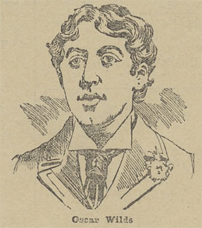Overview

April 6, 1895
The Wilde Trials International News Archive gathers together for the first time international news reports on the famous three London trials of Oscar Wilde, as well as his first year in prison.
Wilde initiated the first trial, which began on April 3, 1895, when he sued the Marquis of Queensberry for criminal libel for having left him a calling card that read “For Oscar Wilde posing Somdomite.” Wilde lost his case, with devastating consequences.
He was arrested on charges of “gross indecency” under Section 11 of the Criminal Law Amendment Act of 1885 and subsequently endured two further criminal trials. Although the first trial resulted in a hung jury, the second concluded with his conviction. Sentenced on May 25, 1895 to two years of prison with hard labour, he lost everything: freedom, fame, family, and fortune.
All three trials, as well as his harsh imprisonment, were a global media event, reported by journalists interested not only in the courtroom proceedings, but also in the sensational stories that unfolded around them — including a Piccadilly street fight, a French duel, and a petition to Queen Victoria to release the writer.
The trials also triggered important debates about gender expression and sexuality, family relations, carceral justice, press standards, and the principle of art for art’s sake.
Currently the archive includes almost 5,000 separate news reports (amounting to nearly 1,5 million words) about Wilde's trials and imprisonment in 1895. These reports have been collected from newspapers from twenty-five different countries and in five languages.
As the first collection of international news reports on the Wilde trials, the Wilde Trials International News Archive offers a number of new opportunities for reading the news as it spread across borders and languages:
- You can read the reports in their original language, or in English translation.
- You can browse through one newspaper’s entire coverage, or search by keyword all the coverage gathered in the collection.
- You can compare one report to another, using the site’s text-comparison tools to retrace how news was copied and transformed as it travelled via news services and telegraph wires around the world.
- You can also find patterns in the data, downloading a range of bibliographic and textual data generated from the collection.
However you explore the Wilde Trials International News Archive, you are invited to understand anew a watershed event in the history of sexuality, justice, and journalism.